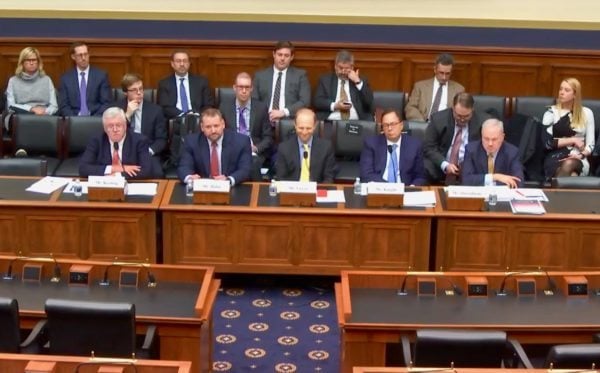
The House Financial Services Committee, Subcommittee on Capital Markets, met for the first time in 2017. A new Chairman, Congressman Bill Huizenga, managed the proceedings for the first topic of the year regarding the “Impact of the JOBS Act After Five Years”.
 The Hearing involved the following witnesses:
The Hearing involved the following witnesses:
- Raymond Keating, Chief Economist, Small Business & Entrepreneurship Council;
- Brian Hahn, Chief Financial Officer, GlycoMimetics, Inc.
- Andy Green, Managing Director of Economic Policy, Center for American Progress
- Edward Knight, Executive Vice President and General Counsel, NASDAQ
- Thomas Quaadman, Vice President, U.S. Chamber of Commerce.
Chairman Huizenga opened the hearing by declaring it was time to build upon the success of the bipartisan JOBS Act by modernizing the US regulatory structure.
Keating, a regular suspect on the Hill regarding issues and challenges pertaining to small business and entrepreneurship, explained the current state of affairs;
“Gaining access to financial capital – whether via equity or debt – is essential to the creation and growth of businesses. At the same time, access to capital remains a major challenge for entrepreneurs starting up and building enterprises across our economy. And since the financial crisis and Great Recession, it arguably has become more difficult to access capital from institutional banks and various capital market players.”
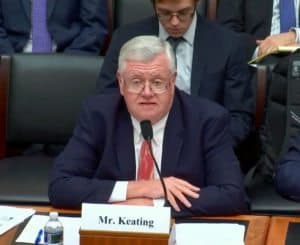 Keating said the trend in small business lending is quite bleak. The regulatory burden is simply too much of a burden.
Keating said the trend in small business lending is quite bleak. The regulatory burden is simply too much of a burden.
“The value of small business loans outstanding hit a high of $711.5 billion in 2008, and subsequently fell for five straight years (to a recent low of $581.9 billion in 2013), with growth subsequently resuming in the following three years. The 2016 level came in at $614.2 billion, which is roughly where the small business loan level was in 2005-06. So, in effect, we’ve seen no growth for a decade.”
Regarding the equity side of the equation, the situation is “troubling”;
“Angel investment also remains down from its 2008 level, while also experiencing stagnation over the last two years. Also, venture capital has shown the most life post-recession, but the decline in 2016 is troubling.”
Keating said these are symptoms of a chronic disease:
“…it is about reduced levels of entrepreneurship,” said Keating. “…these trends speak to the struggles for entrepreneurs to gain access to the financial resources needed to start up and grow.”
Keating acknowledged the benefits of the JOBS Act but pointed to the pressing need of reform. Under Reg CF, the crowdfunding cap should be increased to at least $5 million in a given 12 month period. Additionally, Keating recommended the following:
- Expand the ability of investors to invest
- Clarify liability issues for portals
- Empower syndicate / lead investor models, and more

Hahn said the JOBS Act worked for his Biotech company. The emerging growth qualification has allowed 212 biotech companies to go public over the last 5 years;
“… living proof that Congress can make a difference for emerging innovators. Many of these companies are conducting promising early-stage research that might have been overlooked by investors before the JOBS Act; others are working in a therapeutic area that has historically been difficult to finance. Under the JOBS Act, they were able to raise the capital necessary to fund their life-saving R&D, bringing the next generation of medical advances closer to patients.”
Green called the impact of the JOBS Act as “mixed at best”. Green believes that “regulation is not the problem”. He is of the opinion that portions of the JOBS Act have harmed the IPO market. Green said Title II (accredited crowdfunding) and Title V “work at cross purposes” to boosting IPOs. (Title V raised the number of shareholders of record before a company was compelled to become public). As for Reg CF, Green believes it should be monitored over the next two to three years, then make tweaks as necessary.
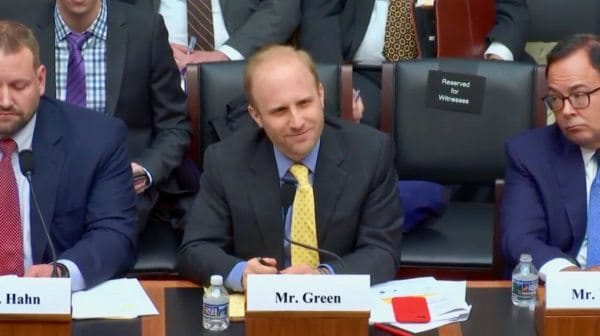
Knight clearly is of the opinion that “investors do not benefit from an overregulated market.” The decline in IPOs on NASDAQ proves that companies are not embracing public markets. There are serious challenges to be listed on a public market;
“Public companies are the best of the best, choosing to live their corporate lives with a high degree of discipline, scrutiny and transparency. But, increasingly over the past decade, there is a new cost for public companies: that the government will intervene into their business models (and not into their private competitors) to impose mandates unrelated to core investor protection or financial performance – – for example, certain policy issues like conflict minerals disclosure and pay ratio and political activity disclosure are encroaching on the public company model.”
There is a direct correlation between excessive regulatory burden and cost to the company. The compliance environment obviously has created a powerful incentive for companies to remain private as long as possible;
“…the impact of new obligations on a public company includes not just costs of the lawyers, accountants and technology support to comply but also expenditure of valuable time and attention from senior management and the board. In a highly competitive global marketplace, costs that do not relate to the core operations of the company are hard to justify.”
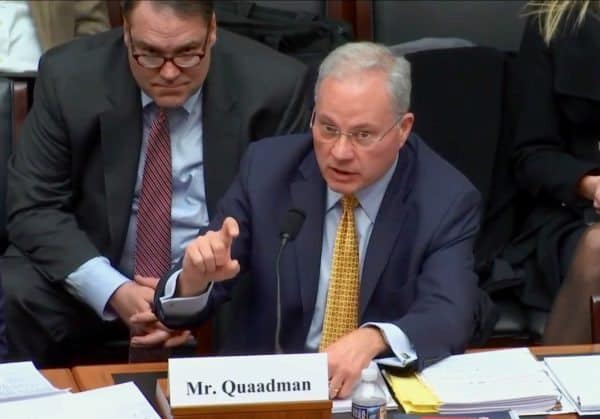
Quaadman complimented the gathering by calling the hearing the “latest iteration of good work” coming out of the House Financial Services Committee. He called the JOBS Act an “initial step” towards bringing the country’s securities laws into the 21st century. Quaadman expressed his concern that fewer public companies leads to fewer jobs and correspondingly less growth for the country.
“Despite the clear evidence that regulation was negatively impacting the ability of companies to raise capital or undergo an IPO, the SEC for years took little action to address the problem. It was the SEC’s neglect of their statutory mission to ―facilitate capital formation‖ that led Congress to intervene and pass the JOBS Act in 2012.”
Quaadman believes the social shift the SEC has taken in recent years is part of the problem;
“Congress should outright reject any further attempts to turn the SEC into an arbiter of political or social cause.”
He also believes the premise of Title II (accredited crowdfunding) was simple but needlessly complex and uncertain. This put a cap on utilization. Regarding Title III (Reg CF), Quaadman voiced his support for the original version of the “Fix Crowdfunding Act” – a bill that may be resurrected soon.
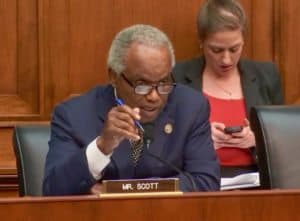 Quaadman championed the creation of the Office of the Advocate for Small Business Capital Formation at the SEC.
Quaadman championed the creation of the Office of the Advocate for Small Business Capital Formation at the SEC.
“[this] presents an opportunity for the SEC to re-focus on its statutory mandate to ―facilitate capital formation,‖ a mandate that the SEC has all too often neglected. The Office will help provide a permanent voice for small business at the SEC, and will serve as an important conduit between companies looking to raise capital and the Chair of the SEC who sets the agenda.”
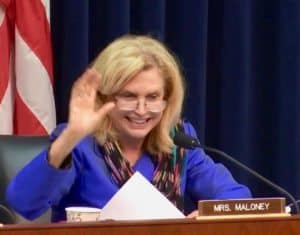 There were a lot of positive comments from the Subcommittee Members present at the hearing. One concerning inquiry from ranking Member Mahoney questioned the RegCF portal that had its regulatory approval revoked. Mahoney appeared to take this as indicative of the potential for fraud instead of an appropriate action by FINRA. She seemed to be unaware that no investor money was ever lost and the industry questioned the site from the day it launched.
There were a lot of positive comments from the Subcommittee Members present at the hearing. One concerning inquiry from ranking Member Mahoney questioned the RegCF portal that had its regulatory approval revoked. Mahoney appeared to take this as indicative of the potential for fraud instead of an appropriate action by FINRA. She seemed to be unaware that no investor money was ever lost and the industry questioned the site from the day it launched.
The key take aways from the hearing is that Congress must do more. Improving access to capital for entrepreneurs and small business is vital for the well-being of the country. And how can you be against that?

